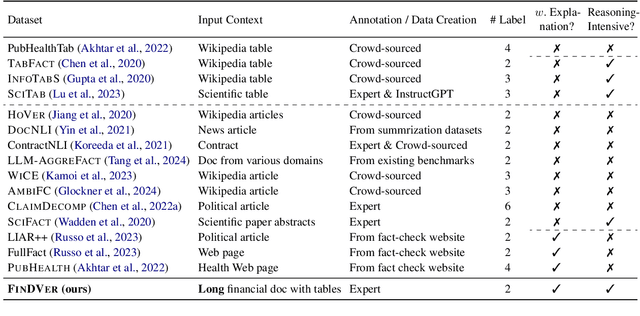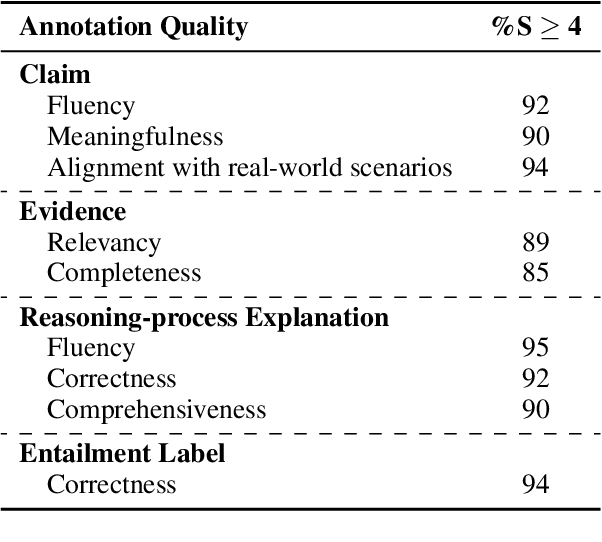Chengye Wang
AbGen: Evaluating Large Language Models in Ablation Study Design and Evaluation for Scientific Research
Jul 17, 2025Abstract:We introduce AbGen, the first benchmark designed to evaluate the capabilities of LLMs in designing ablation studies for scientific research. AbGen consists of 1,500 expert-annotated examples derived from 807 NLP papers. In this benchmark, LLMs are tasked with generating detailed ablation study designs for a specified module or process based on the given research context. Our evaluation of leading LLMs, such as DeepSeek-R1-0528 and o4-mini, highlights a significant performance gap between these models and human experts in terms of the importance, faithfulness, and soundness of the ablation study designs. Moreover, we demonstrate that current automated evaluation methods are not reliable for our task, as they show a significant discrepancy when compared to human assessment. To better investigate this, we develop AbGen-Eval, a meta-evaluation benchmark designed to assess the reliability of commonly used automated evaluation systems in measuring LLM performance on our task. We investigate various LLM-as-Judge systems on AbGen-Eval, providing insights for future research on developing more effective and reliable LLM-based evaluation systems for complex scientific tasks.
SciVer: Evaluating Foundation Models for Multimodal Scientific Claim Verification
Jun 18, 2025Abstract:We introduce SciVer, the first benchmark specifically designed to evaluate the ability of foundation models to verify claims within a multimodal scientific context. SciVer consists of 3,000 expert-annotated examples over 1,113 scientific papers, covering four subsets, each representing a common reasoning type in multimodal scientific claim verification. To enable fine-grained evaluation, each example includes expert-annotated supporting evidence. We assess the performance of 21 state-of-the-art multimodal foundation models, including o4-mini, Gemini-2.5-Flash, Llama-3.2-Vision, and Qwen2.5-VL. Our experiment reveals a substantial performance gap between these models and human experts on SciVer. Through an in-depth analysis of retrieval-augmented generation (RAG), and human-conducted error evaluations, we identify critical limitations in current open-source models, offering key insights to advance models' comprehension and reasoning in multimodal scientific literature tasks.
A Neuro-inspired Interpretation of Unlearning in Large Language Models through Sample-level Unlearning Difficulty
Apr 09, 2025Abstract:Driven by privacy protection laws and regulations, unlearning in Large Language Models (LLMs) is gaining increasing attention. However, current research often neglects the interpretability of the unlearning process, particularly concerning sample-level unlearning difficulty. Existing studies typically assume a uniform unlearning difficulty across samples. This simplification risks attributing the performance of unlearning algorithms to sample selection rather than the algorithm's design, potentially steering the development of LLM unlearning in the wrong direction. Thus, we investigate the relationship between LLM unlearning and sample characteristics, with a focus on unlearning difficulty. Drawing inspiration from neuroscience, we propose a Memory Removal Difficulty ($\mathrm{MRD}$) metric to quantify sample-level unlearning difficulty. Using $\mathrm{MRD}$, we analyze the characteristics of hard-to-unlearn versus easy-to-unlearn samples. Furthermore, we propose an $\mathrm{MRD}$-based weighted sampling method to optimize existing unlearning algorithms, which prioritizes easily forgettable samples, thereby improving unlearning efficiency and effectiveness. We validate the proposed metric and method using public benchmarks and datasets, with results confirming its effectiveness.
MMVU: Measuring Expert-Level Multi-Discipline Video Understanding
Jan 21, 2025



Abstract:We introduce MMVU, a comprehensive expert-level, multi-discipline benchmark for evaluating foundation models in video understanding. MMVU includes 3,000 expert-annotated questions spanning 27 subjects across four core disciplines: Science, Healthcare, Humanities & Social Sciences, and Engineering. Compared to prior benchmarks, MMVU features three key advancements. First, it challenges models to apply domain-specific knowledge and perform expert-level reasoning to analyze specialized-domain videos, moving beyond the basic visual perception typically assessed in current video benchmarks. Second, each example is annotated by human experts from scratch. We implement strict data quality controls to ensure the high quality of the dataset. Finally, each example is enriched with expert-annotated reasoning rationals and relevant domain knowledge, facilitating in-depth analysis. We conduct an extensive evaluation of 32 frontier multimodal foundation models on MMVU. The latest System-2-capable models, o1 and Gemini 2.0 Flash Thinking, achieve the highest performance among the tested models. However, they still fall short of matching human expertise. Through in-depth error analyses and case studies, we offer actionable insights for future advancements in expert-level, knowledge-intensive video understanding for specialized domains.
FinDVer: Explainable Claim Verification over Long and Hybrid-Content Financial Documents
Nov 08, 2024



Abstract:We introduce FinDVer, a comprehensive benchmark specifically designed to evaluate the explainable claim verification capabilities of LLMs in the context of understanding and analyzing long, hybrid-content financial documents. FinDVer contains 2,400 expert-annotated examples, divided into three subsets: information extraction, numerical reasoning, and knowledge-intensive reasoning, each addressing common scenarios encountered in real-world financial contexts. We assess a broad spectrum of LLMs under long-context and RAG settings. Our results show that even the current best-performing system, GPT-4o, still lags behind human experts. We further provide in-depth analysis on long-context and RAG setting, Chain-of-Thought reasoning, and model reasoning errors, offering insights to drive future advancements. We believe that FinDVer can serve as a valuable benchmark for evaluating LLMs in claim verification over complex, expert-domain documents.
 Add to Chrome
Add to Chrome Add to Firefox
Add to Firefox Add to Edge
Add to Edge